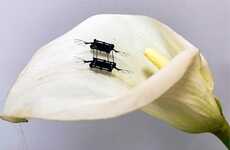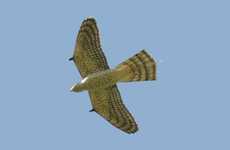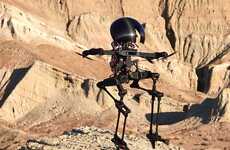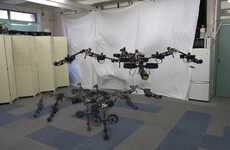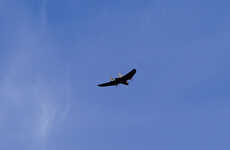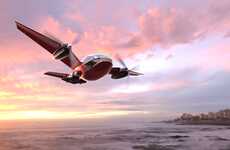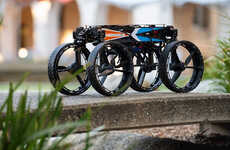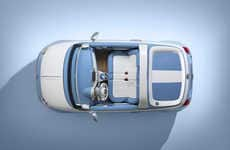
The 'Albatross' Uses Huge Wings and Tiny Sensors For Efficient Flight
Rahul Kalvapalle — May 19, 2018 — Autos
References: web.mit.edu & newatlas
A group of engineers and scientists working out of MIT have developed a high-tech amphibious gliding robot that is equally capable of zipping along the water and gliding through the air like a bird.
Dubbed the Albatross, this particular gliding robot is a bio-inspired creation in that its design takes note of the unique wings of the albatross bird, which is known for massive wings that allow the birds to literally fly for years at a time and glide for huge distances with minimal effort. It is precisely this functionality that the Albatross gliding robot is looking to emulate, and it does this by using behemoth wings as well as high-tech systems that include GPS, ultrasound and an array of sensors that enable the glider to move with minimal energy consumption.
With eco-friendly and efficient transportation becoming increasingly important on land, on the sea and in the air, scientists are increasingly looking to nature for design inspiration, and the Albatross is a by-product of this approach.
Dubbed the Albatross, this particular gliding robot is a bio-inspired creation in that its design takes note of the unique wings of the albatross bird, which is known for massive wings that allow the birds to literally fly for years at a time and glide for huge distances with minimal effort. It is precisely this functionality that the Albatross gliding robot is looking to emulate, and it does this by using behemoth wings as well as high-tech systems that include GPS, ultrasound and an array of sensors that enable the glider to move with minimal energy consumption.
With eco-friendly and efficient transportation becoming increasingly important on land, on the sea and in the air, scientists are increasingly looking to nature for design inspiration, and the Albatross is a by-product of this approach.
Trend Themes
1. Bio-inspired Gliding Robots - There is potential for further development of gliding robots that mimic the capability of biological organisms to improve efficiency in transportation systems.
2. Efficient Sensor Technology - Sensor technology can be used to optimize energy usage, helping reduce carbon footprint in various industries from transportation to manufacturing.
3. Eco-friendly Transportation - Eco-friendly transportation methods will continue to grow in popularity and become increasingly important in light of the global push for sustainability.
Industry Implications
1. Robotics Industry - The robotics industry can leverage bio-inspired designs and efficient sensors like the Albatross, opening up opportunities to improve in fields such as manufacturing, exploration, and agriculture.
2. Transportation Industry - The transportation industry can benefit from bio-inspired designs and sensor technology to create energy-efficient systems, reducing costs while also striking a balance between meeting the needs of consumers and reducing carbon footprint.
3. Marine Industry - The marine industry could look into producing more eco-friendly boats, submarines, and underwater drones that take inspiration from the unique biomimicry design of the Albatross and fly over water.
3
Score
Popularity
Activity
Freshness

